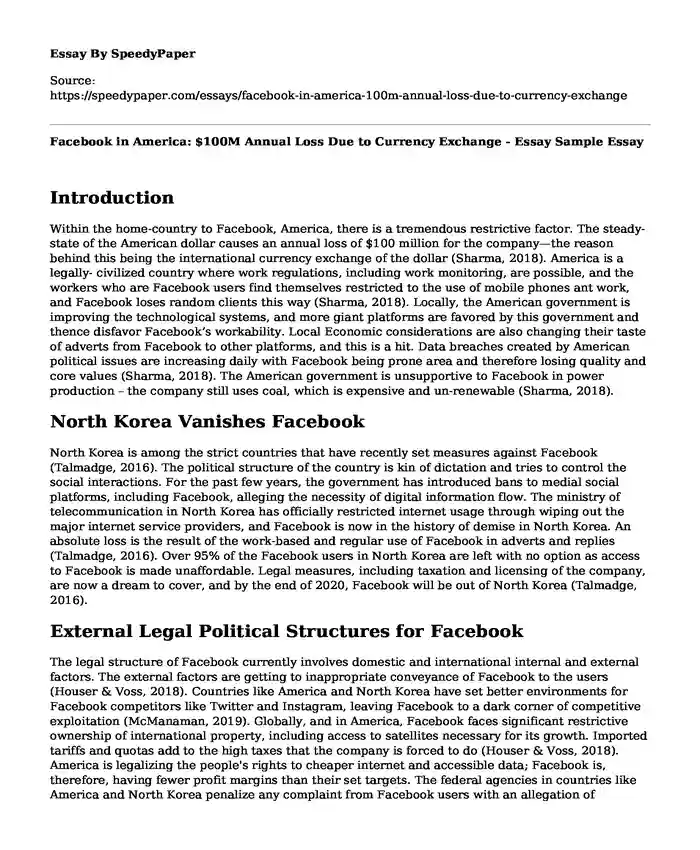
| Type of paper: | Essay |
| Categories: | Facebook United States Finance |
| Pages: | 3 |
| Wordcount: | 692 words |
Introduction
Within the home-country to Facebook, America, there is a tremendous restrictive factor. The steady-state of the American dollar causes an annual loss of $100 million for the company—the reason behind this being the international currency exchange of the dollar (Sharma, 2018). America is a legally- civilized country where work regulations, including work monitoring, are possible, and the workers who are Facebook users find themselves restricted to the use of mobile phones ant work, and Facebook loses random clients this way (Sharma, 2018). Locally, the American government is improving the technological systems, and more giant platforms are favored by this government and thence disfavor Facebook’s workability. Local Economic considerations are also changing their taste of adverts from Facebook to other platforms, and this is a hit. Data breaches created by American political issues are increasing daily with Facebook being prone area and therefore losing quality and core values (Sharma, 2018). The American government is unsupportive to Facebook in power production – the company still uses coal, which is expensive and un-renewable (Sharma, 2018).
North Korea Vanishes Facebook
North Korea is among the strict countries that have recently set measures against Facebook (Talmadge, 2016). The political structure of the country is kin of dictation and tries to control the social interactions. For the past few years, the government has introduced bans to medial social platforms, including Facebook, alleging the necessity of digital information flow. The ministry of telecommunication in North Korea has officially restricted internet usage through wiping out the major internet service providers, and Facebook is now in the history of demise in North Korea. An absolute loss is the result of the work-based and regular use of Facebook in adverts and replies (Talmadge, 2016). Over 95% of the Facebook users in North Korea are left with no option as access to Facebook is made unaffordable. Legal measures, including taxation and licensing of the company, are now a dream to cover, and by the end of 2020, Facebook will be out of North Korea (Talmadge, 2016).
External Legal Political Structures for Facebook
The legal structure of Facebook currently involves domestic and international internal and external factors. The external factors are getting to inappropriate conveyance of Facebook to the users (Houser & Voss, 2018). Countries like America and North Korea have set better environments for Facebook competitors like Twitter and Instagram, leaving Facebook to a dark corner of competitive exploitation (McManaman, 2019). Globally, and in America, Facebook faces significant restrictive ownership of international property, including access to satellites necessary for its growth. Imported tariffs and quotas add to the high taxes that the company is forced to do (Houser & Voss, 2018). America is legalizing the people's rights to cheaper internet and accessible data; Facebook is, therefore, having fewer profit margins than their set targets. The federal agencies in countries like America and North Korea penalize any complaint from Facebook users with an allegation of breaking the law (McManaman, 2019). Zoning is a factor in many Facebook target countries where internet access is limited in some areas. For developing countries like the majority in Africa, internet access is limited through poor connections or governmental code of ethics (McManaman, 2019).
Internal Legal Political Structures for Facebook
Similarly, in the domestic region, there are zones where Facebook use is an offense, including the political working offices and cyber-based agencies. The decentralized organizational structure of Facebook is a gear to its failure; due to the spreading scares resources like the energy that it is affording (Houser & Voss, 2018). The information flow of Facebook is becoming weak by delocalization without the Facebook consent of losing customers due to soft innovations and cyberbully to the company. The systematic technology infrastructure is also becoming worse –governments offer Facebook a poor artificial intelligence (AI) globally (Houser & Voss, 2018).
References
Houser, K. A., & Voss, W. G. (2018). GDPR: The end of Google and facebook or a new paradigm in data privacy. Rich. JL & Tech., 25, 1.
McManaman, R. M. (2019). Strategic Audit of Facebook Through the Lens of International Reputation.
Sharma, P. (2018). Towards an Orchestration of Forecasting Methods to Devise Strategies for Design. Doctoral dissertation.
Talmadge, E. (2016). North Korea announces blocks on Facebook, Twitter and YouTube. The Guardian, 1.
Cite this page
Facebook in America: $100M Annual Loss Due to Currency Exchange - Essay Sample. (2023, Sep 17). Retrieved from https://speedypaper.net/essays/facebook-in-america-100m-annual-loss-due-to-currency-exchange
Request Removal
If you are the original author of this essay and no longer wish to have it published on the SpeedyPaper website, please click below to request its removal:
- Free Essay on Unmanned Aerial Vehicles and Computer Politics
- The Underground Railroad Movie - Free Essay Sample
- Paper Example: A Trade Deficit
- Paper Example. Role of the Central Bank
- Essay Sample on Obama: Reducing Carbon Emissions in US Power Plants
- Free Essay Example on Primary Health Concerns of the U.S. Population
- Paper Example on Effects on the United States due to changes in Eastern Europe
Popular categories




